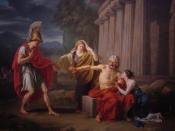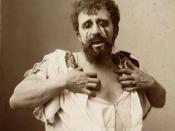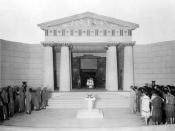A World of Tragedy
Human nature is as old as mankind itself. Throughout history, despite differing locations, differing culture, differing perspective, human nature is unchanged. It is forever in our minds and in our souls. The basic emotions of every human being is implanted in our minds at birth, and develops and grows along with our bodies. But due to varied restrictions, such as cultural laws, morality, and/or human limitations, some emotions cannot be acted out upon. The next step is to seek it through others. Through them we may be able to experience fear, or happiness, or sadness, or tragedy. This idea caught on by the ancient Greek "tragedians" Aeschylus, Sophocles, and Euripides. Through their plays, they were able to provoke different emotions in their audience, tragedy in particular. Being able to watch human suffering, paradoxically, gives the audience pleasure. Sophocles was a master of this. With the usage of dramatic structure in his plays Sophocles insured his fame and popularity for thousands of centuries.
One tragedy in particular, Oedipus Rex, is a prime example of this step-by-step process.
The fist part of the dramatic structure of classical tragedy, also referred to as "Machine of the Gods", is In Media Res. This term refers to the
technique where a story or narrative begins in the middle instead of where the main events first start taking place. In Oedipus Rex, this occurs during the prologue where Oedipus address the people of Thebes, "... why have you strewn yourself before these altars in Supplication, with your boughs and garlands?..." (1060-1061). This fills the audience in on what has happened and what is to come. The next part is the Protasis, or, the initial introduction to the play. This is when the Priest explains and introduces the settings and some of what's going on, to both Oedipus and the audience. "Your own eyes must tell you: Thebes is tossed on a murdering sea and can not lift her from the death surge..." (1061- 1062).
Now begins the upward climb to the inevitable Climax. Starting with the Exciting Force, or, the catalyst for complication. Here, Oedipus tells of his intentions to reveal who has brought the curse upon Thebes, "Then once more I must bring what is dark to light..." (1064). Oedipus asks the people of Thebes to inform him of any knowledge about the murder of Laios. This creates anticipation and anxiousness within the audience. The complications then begin to rise in the Epitasis. The Choragos tell Oedipus of a blind seer, Theiresias, who may know more about the murder. Oedipus questions Theiresias, who refuses to spill the beans. During the conversation between Theiresias and Oedipus, Theiresias begins by saying, " How dreadful knowledge of the truth can be when there is no help in truth." (1069) An argument then ensues resulting in Theiresias giving in and telling of Oedipus' sins, the big public announcement. Here the audience may begin to become excited to see the struggle predicted to come. Because of Oedipus' pride, he wants proof on Theiresias accusations and makes his biggest mistake, the Hamatia. All Greek tragedies follow a similar outline, and the Hamatia is one of the most essential elements to that. It usually involves a mistake or flaw in the main character which leads them in the opposite direction they desire and may result in disastrous consequences. Oedipus demands to speak with the shepherd, who knows more than Oedipus would care to discover. "Go, one of you, and bring the shepherd here..." (1088). The Hamartia is Oedipus' great failure as a hero of the story and suffers greatly for it. Now, this may cause the audience to become sympathetic, or even grieve over Oedipus' ignorance.
Every single story or narrative worth one's time has a Climax. It is essential to all bodies of writing, theatrical plays, movies, and more. It occurs at the peak of rising action and immediately before the falling. It is during the climax of Greek tragedies that the protagonist, in this case Oedipus, discovers all and is destined to fail in the end with little hope of recovery. However, the climax Oedipus Rex is strikingly different than most
plays of the same caliber. For no one dies or is murdered. But instead, the realization of truth on Oedipus' behalf. All the events of searching and dead ends lead to the ultimate discovery. Oedipus talks to the shepherd who knows the truth of Oedipus' life. After much fighting, the shepherd reluctantly tells the truth. The infant given to the shepherd was in fact "... Laios' child..." (1091) and continues on to say "... It was said that the boy would kill his father..." (1091). The shepherd tells Oedipus that he gave the child to the messenger because he "â¦pitied the babyâ¦" (1091). The shepherd then says that "â¦For if you are what this man says you are, no man living is more wretched than Oedipus." (1091) Oedipus finally realizes that it was he whom he had been searching for all along. The climax serves its purpose of shocking the audience. From that moment forward, everything goes down hill in the falling action. What was once unknown to Oedipus is now known in the Anagnorisis, realization of something unknown. "Ah God! It was true! All the prophecies!..." (1091). Here the audience can feel his pain and surprise.
Enraged, Oedipus seeks out aimlessly to cause damage to himself. The Tragic Force has Oedipus speaking out, "Oh Light my I see you for the last time..." (1093-1094). The messenger then brings more tragedy with the Catastasis, "The queen is dead" (1093). The audience is then shocked by
whose hands she was murdered by, "Her own" (1093). At the end of the falling action lies the worst moments in the play, the Catastrophe. It is then that the messenger reports of King Oedipus stabbing his own eyes. "â¦the king ripped from her gown the golden brooches that were her ornament, and raised them, and plunged them down straight into his own eyeballsâ¦" (1094).
As in every struggle in life, there is Resolution. For the people of Thebes, it is having there old king, Oedipus, exiled and having Creon take over. Choragos informs Oedipus are his arrival and their intentions. "Kreon is here now. As to what you ask, he may decide the course to take. He only is left to protect the city in your place." (1098) To wrap it all up in the Catharsis, Choragos gives a few departing lines (1467- 1475) of the dangers of pride and uses Oedipus as the example of how pride can turn against ones self. "Presume on his good fortune until he fin life, at his death, a memory without pain." (1101)
In conclusion, Sophocles uses the dramatic structure, but with some untraditional plot elements. Separating Oedipus Rex from the other tragedies, but retaining it's status among the ranks of the great Greek tragedies.
References:
Sophocles. Oedipus the King by Sophocles. Directions masters. Mont Albert, Vic: Education Essentials, 1990.
� PAGE �6�





